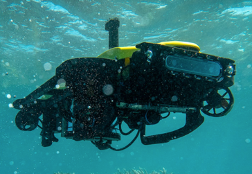New TAS project to develop an Australian Code of Practice for the Design, Construction, Survey and Operation of Autonomous and Remotely Operated Vessels in 2021
By Rachel Horne – Assurance of Autonomy Lead/Director of Autonomy Accreditation – Maritime
Autonomous systems technology offers the ability to increase safety and efficiency, while lowering economic and environmental cost. While some level of autonomy has been seen in commercial products for a number of years, for example the basic thermostat or the Roomba, in the last five years there has been a rapid acceleration in the capacity and availability of unmanned aerial vehicles known as drones, and in uncrewed surface and sub-surface vessels, also called autonomous vessels.
For this rapid acceleration to continue, and to ensure this technology can integrate into commercial and defence operations, autonomous systems need to be trusted by the government, regulators, operators, and the broader community. An integral part of gaining trust is having a clear, well-tailored regulatory framework, consistent assurance requirements and agreed assurance methodology, and support from the regulator. These same factors also facilitate innovation and promote growth in industry by providing certainty.
New project: Development of an Australian Code of Practice
The NASF-P (National Accreditation Support Facility Pathfinder) team have commenced a number of new projects to address the challenges outlined above. One of these projects is aimed at addressing the lack of tailored standards for autonomous and remotely operated vessels by developing an Australian Code of Practice for the Design, Construction, Survey and Operation of Autonomous and Remotely Operated Vessels. This Code will represent best practice, and is intended to provide certainty for industry by providing a set of regulator-acknowledged standards that they can use to design, construct, survey and operate autonomous and remotely operated vessels. The Code of Practice will be voluntary, and will be updated periodically.
This project, led by Maaike Vanderkooi on behalf of TAS, will begin with a review of available Codes of Practice and Standards, for example the UK Maritime Autonomous Surface Ships (MASS) UK Industry Conduct Principles and Code of Practice, and Lloyd’s Register Unmanned Marine Systems Code. The project will then develop a draft Australian Code of Practice, using input from key stakeholders, which will then be released for broader public consultation. The intent is to release a draft Code of Practice by October 2021, which will be available for use by industry and the regulator.
Maaike Vanderkooi has been chosen to lead the project as a result of her extensive experience in developing regulatory frameworks in the maritime, heavy vehicle and ports arenas, and her experience in developing, reviewing and impact assessing commercial vessel standards.
TAS will engage closely with key stakeholders, including the Australian Maritime Safety Authority (AMSA), the Australian Association for Unmanned Systems (AAUS) Maritime Working Group, the Marine Surveyors Association Inc, and the Australasian Institute of Marine Surveyors, throughout this project to ensure the Code of Practice is practical and appropriate for use by Australian industry and the regulator. There will also be opportunities for input by interested parties throughout the project.
Engagement opportunities
- We are looking for people with direct experience applying current Codes of Practice or Standards to autonomous and remotely operated vessels, to discuss their experience and provide feedback to us in May 2021;
- We will hold a series of workshops with key stakeholders between May and August 2021; and
- We will release the draft Code of Practice for public consultation in August 2021, and welcome all thoughts and feedback.
If you would like to contact us in relation to this project, to offer feedback, suggestions, or your assistance, please email us at NASFP@tasdcrc.com.au.
Other NASF-P projects underway
The NASF-P team have a number of projects underway, including:
- Preparation of a Body of Knowledge on the assurance and accreditation of autonomous systems;
- Air domain: development of an end-to-end acceptable process for the design, build, test and evaluation of autonomous detect and avoid (DAA) systems for certain types of airspace;
- Maritime domain: development of a repeatable, regulator-accepted methodology to demonstrate compliance with COLREGS for autonomous and remotely operated vessels; and
- Preparation of a business case for a new, independent, National Accreditation Support Facility, based in Queensland, that will better connect operators and regulators to facilitate more efficient assurance and accreditation.
The NASF-P team recently worked with Queensland AI Hub, Australian Institute of Marine Science, and AMC Search, supported by Advance Queensland, to deliver a world-first pilot course ‘Autonomous Marine Systems Fundamentals for Marine Surveyors’. This course, which was created to address the gap in experience with autonomous marine systems amongst the accredited marine surveyor community, had nine participants from around Queensland.
If you would like to find out more about our work, or provide feedback on where you see the key risks and opportunities for the autonomous systems industry in Australia, please contact us as NASFP@tasdcrc.com.au






